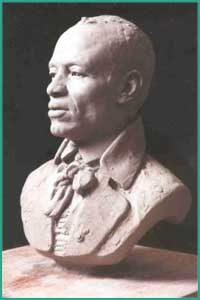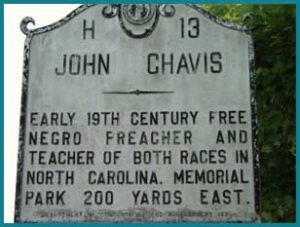An Exceptional Overcoming, in Difficult Times
by Rev. David T. Myers
 John Chavis was born in 1763 (or possibly 1762) in Granville County, North Carolina—a sparsely populated area north of Raleigh bordering Mecklenburg County, Virginia. While the details surrounding his early life and ancestry can be hazy, we know that members of the Chavis family were, along with one other family (the Harrises), the first people of African descent to be recognized as free persons in Granville County. John Chavis—whose lineage was a mix of African, American Indian, and Caucasian—came from a distinguished line of free Blacks who owned property and were committed to educating themselves as best they could. A descendant of Chavis later recalled, “My grandmother, mother, and great grandmother were all free people and Presbyterians.”
John Chavis was born in 1763 (or possibly 1762) in Granville County, North Carolina—a sparsely populated area north of Raleigh bordering Mecklenburg County, Virginia. While the details surrounding his early life and ancestry can be hazy, we know that members of the Chavis family were, along with one other family (the Harrises), the first people of African descent to be recognized as free persons in Granville County. John Chavis—whose lineage was a mix of African, American Indian, and Caucasian—came from a distinguished line of free Blacks who owned property and were committed to educating themselves as best they could. A descendant of Chavis later recalled, “My grandmother, mother, and great grandmother were all free people and Presbyterians.”
As a young man, Chavis received an excellent education, likely under the tutelage of the Rev. Henry Pattillo, who would have instructed him in Greek and Latin. Around 1780, Chavis enlisted in the Fifth Virginia Regiment, fighting for the Patriot cause, as many of his relatives did, in the Revolutionary War. In 1792, as an older “non-traditional” student, Chavis was admitted to Princeton using scholarship money from something called the Leslie Fund. In order to be admitted to Princeton, a student had to be tested in English grammar, orthography, punctuation, composition, geography, United States history, Latin grammar, Greek grammar, and mathematics. Chavis was well educated and a quick learner. While at Princeton, he received private instruction from John Witherspoon (which is why I first became interested in Chavis). In 1793 or 1794 Chavis left Princeton (because of Witherspoon’s death?) and later finished his academic studies at Washington College (Virginia) in 1802.
While in Virginia, Chavis was picked out as a suitable candidate for the ministry. In particular, many Southern whites were eager to see Chavis evangelize other Blacks. On October 19, 1799, Chavis was received under the care of Lexington Presbytery. A year later, one of the elders of the presbytery argued that the work of evangelization was too important to prolong Chavis’s trials any further. After a unanimous vote to sustain his exams, Chavis was granted a license to preach. By some accounts, he was the first Black in America ordained by the Presbyterian Church, though technically he only received his licensure, never final ordination.
Chavis was commissioned as a “riding missionary under the direction of the General Assembly,” first under Lexington Presbytery, then Hanover Presbytery, and finally Orange Presbytery. Although his mission was to preach to other Blacks, records indicate that he preached to more whites, up to 800 at a time. Chavis desired to preach to “his own people,” but slaves were often not allowed to worship in white churches. Chavis’s missionary trips were mostly preaching tours, but he also assisted with the Lord’s Supper and performed some pastoral duties.
In addition to a well-received preaching ministry, Chavis was an exceptionally gifted educator, opening a classical school in Raleigh in 1805. At first, the school was integrated, but later white parents insisted that Chavis instruct Blacks and whites separately. At full strength—Chavis was often sick and suffered from debilitating arthritis—the school in Raleigh was home to many of North Carolina’s leading families. Chavis taught a future governor, future lawyers, future pastors, and was especially close throughout his life to the future U.S. Senator Willie Mangum.
 After three decades of successful teaching and preaching—and, it seems, a measure of prosperity from dabbling in real estate—Chavis saw his ministry (and his money) dry up in the 1830s. In 1832, in response to Nat Turner’s Rebellion of August 1831, the North Carolina legislature made it unlawful for any free person of color to preach or exhort in public or to officiate as a preacher. Chavis pleaded with the Presbytery for financial support, but the collection they took was little more than $50. In an effort to pay his bills and provide for his wife and children (about whom we know next to nothing), he requested in 1832 that the Presbytery publish his Letter Upon the Doctrine of the Extent of the Atonement of Christ. The Presbytery denied the request, arguing that the subject had already been dealt with by others and there was little chance the short pamphlet would produce much income. No doubt, the Presbytery also demurred because Chavis had drifted from confessional Reformed orthodoxy. In the Letter, Chavis argued that the free offer of the gospel was inconsistent with limited atonement and that the eternal decrees of God were based on “nothing more nor less than his foreknowledge.” Judging by his Letter, Chavis was a passionate gospel preacher who aligned with the New School wing of the Presbyterian controversies of the 1830s.
After three decades of successful teaching and preaching—and, it seems, a measure of prosperity from dabbling in real estate—Chavis saw his ministry (and his money) dry up in the 1830s. In 1832, in response to Nat Turner’s Rebellion of August 1831, the North Carolina legislature made it unlawful for any free person of color to preach or exhort in public or to officiate as a preacher. Chavis pleaded with the Presbytery for financial support, but the collection they took was little more than $50. In an effort to pay his bills and provide for his wife and children (about whom we know next to nothing), he requested in 1832 that the Presbytery publish his Letter Upon the Doctrine of the Extent of the Atonement of Christ. The Presbytery denied the request, arguing that the subject had already been dealt with by others and there was little chance the short pamphlet would produce much income. No doubt, the Presbytery also demurred because Chavis had drifted from confessional Reformed orthodoxy. In the Letter, Chavis argued that the free offer of the gospel was inconsistent with limited atonement and that the eternal decrees of God were based on “nothing more nor less than his foreknowledge.” Judging by his Letter, Chavis was a passionate gospel preacher who aligned with the New School wing of the Presbyterian controversies of the 1830s.
During his lifetime, Chavis remained a committed Presbyterian, an ardent Federalist, and a critic of racism and slavery. Though these criticisms were, by necessity, often more private than public, he did not hesitate to implore his friend and one-time student Willie Mangum to stand against the tyrant Andrew Jackson. He also informed Mangum that though the insurrection was abominable, he thought Nat Turner was an innocent man.
On June 15, 1838, John Chavis passed from this world into the next, his obituary noting that “his christian character gave comfort to his friends.” Later that fall, the Orange Presbytery resolved to provide Chavis’s widow with a lifelong pension of $40 a year.
Although I wish his theological thoughts were more in line with the Old School side of things, my greater wish—if that’s the right word—is to wonder how much more his ministry might have been had it not be hampered, and then silenced, by the growing rumbles of racial animus and fear. I doubt many of us have heard of John Chavis, but his impressive learning, his itinerant preaching, and his successful teaching mark him out as an important leader in the Old South, particularly among Presbyterians.
Information for this post was taken from Ernest Trice Thompson, Presbyterians in the South, Volume One (1607-1861), and especially from Helen Chavis Othow, John Chavis: African American Patriot, Preacher, Teacher, and Mentor (1763-1838).
